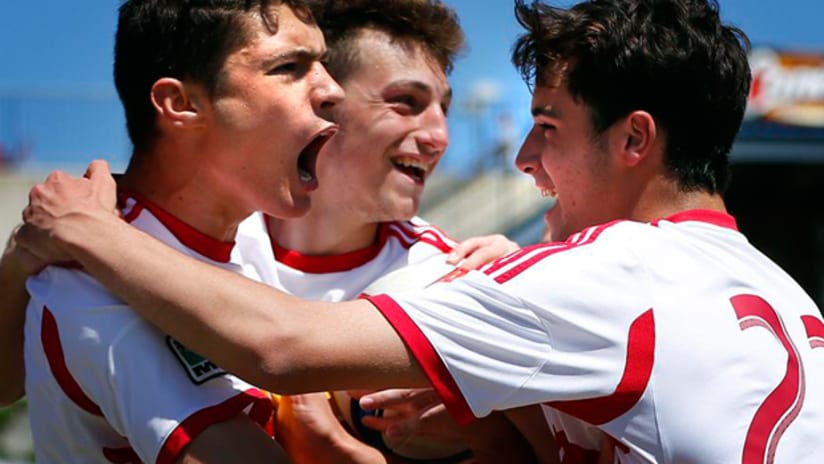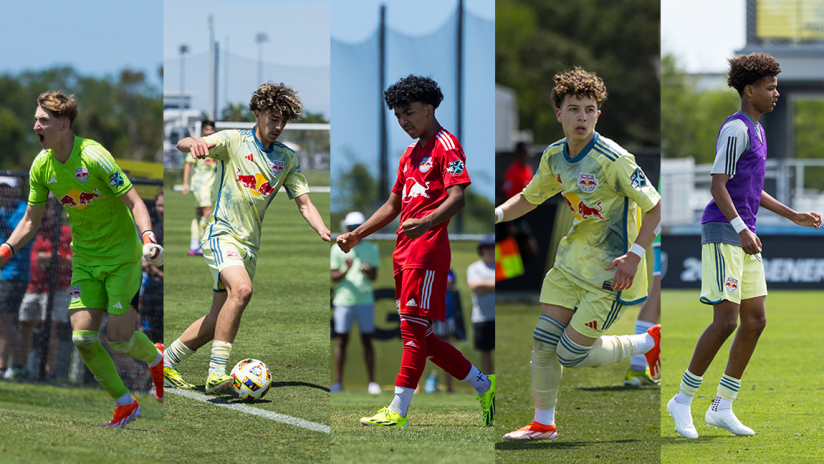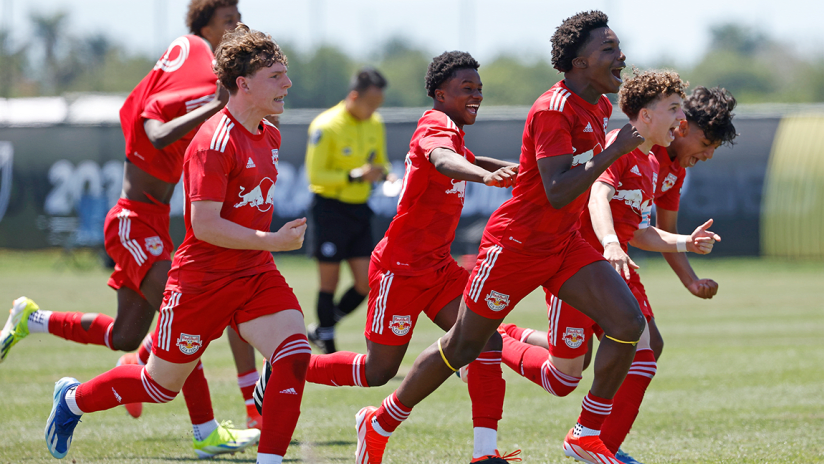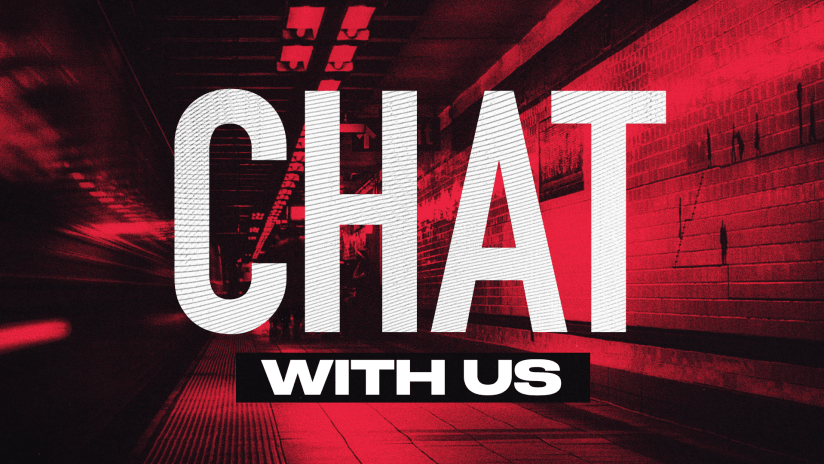Unlike the established soccer nations throughout the rest of the world, the United States didn’t create Major League Soccer from the ground up. In this country, you couldn’t spend money on a developmental system until the finished product was firmly established.
Now that MLS is on solid ground, teams are pouring money into their youth camps and their academy teams, and the Red Bulls have set up arguably the best system, top to bottom, in the country.
“You want to build the pro leagues first. You’re creating Major League Soccer and you want to make a product that is immediately marketable and sustainable,” said Simon Barrow, manager of the Red Bulls’ Regional Development Schools. “Hence, you go out and get Thierry Henry, you get Tim Cahill, because you’ve got to put a product on the field that is immediately recognizable to the fans. Now, once you’ve shown the league is sustainable, you turn your attention to the grass roots. Now you can focus on something organic that’s going to grow into that.
“If you started with this before you built the pro level, maybe MLS doesn’t exist and you invested all this money in the grass roots for no good reason. It is kind of back to front, but it is a necessary evil in this country. But now it’s here to stay.”
Okay, so we did it backwards. But going forward, the dividends will be enormous.
As the Red Bulls summer camp season is coming to an end, many of them had been fully booked since March, according to Barrow. A recent camp at the Peddie School in Hightstown, N.J., which consisted of 180 kids, there was a coaching ratio of 1 to 12. And that was one of the smaller camps of the summer. Barrow said they do camps with more than 300 kids. And it’s not just boys, there are all-girls camps as well as co-ed camps.
“We’re not in this for the money,” said Barrow, who said the residential camp at Peddie cost $715 per child. “There are a lot of soccer camps that are independent of any entity. It’s a business, a financial investment. A lot of people will run their camps and their profit margin will be significant because it’s their business. We make enough to cover our operating costs, and that’s pretty much it because there’s a higher prize at stake.
“For one, the brand recognition and the association with Red Bulls, which is going to help our team moving forward, and two, the possibility of uncovering talent that will make our first team better. We don’t want to price people out of the market because soccer is such an all-encompassing sport. It used to be such a middle-class sport in this country. It’s not the case now. The middle class is playing it, but so are the less affluent areas. It’s the world’s game.”
The camp’s diversity was proof of that.
“The way you work in New Jersey you’ve got little pockets of communities,” Barrow said. “We’ve got Hispanic kids, European kids. There’s three or four English kids, a lot of Asian kids, Indian kids. Literally, you name a culture or demographic and there’s a representative of that culture in this camp. African-American, Far East, Middle East, South American. That’s a big part of the philosophy and culture that we’re trying to create.”
And soccer skills aren’t the only aspect of the game that is taught. Kids of all ages learning the game need to respect the game as well.
“It’s a big part of our philosophy. We talk about respect for the game in total,” Barrow said. “That’s referees, position coaches, your own parents, the opposition’s parents. What we say to the kids on the first day of camp is our goal when you leave is that we don’t want you to just leave a better player, but a better person as well. So we’re educating them on how they conduct themselves, holding them to the highest possible standard, and respect for referees and everyone else in the game is part of that.”
The Red Bulls also don’t judge a young player early. They let kids develop, so if you have a bad day or a bad week, it’s not the end.
“We also recognize in our program that just because you haven’t made it at that level doesn’t mean you’re not going to,” Barrow said. “We keep them in the program and help them develop in case you get any late bloomers. So much can happen at this stage, so you don’t want to write any of them off early.”
You look at some of the players that have passed through the Red Bulls Academy. Not all of them were stars early on.
“Even before we had success with guys like Matt Miazga and Sean Davis, we had players like Juan Agudelo. That was when the program was in its infancy. Matt is a great example. He came through the program all five years and signed a contract at 19 years of age and is now making a difference. He’s one of the first names on the first-team sheet.”
In the past, MLS clubs, including the Red Bulls, developed players, but the road to the first team was blocked by big-name players that were brought in to enhance the brand, whether they fit in or not. This year the philosophy of the club changed under Sporting Director Ali Curtis and head coach Jesse Marsch. An emphasis was placed on player development.
“There’s a lucrative career waiting for them in soccer if they apply themselves properly,” Barrow said. “Miazga is a classic example of that. He’s just the first of many, hopefully. We’ve got the No. 1 academy system in the country and it should be a conveyor belt of talent. Our goal is to be the conveyor belt that serves that conveyor belt.”
Barrow said even if those players are blocked from starting because older, established players are entrenched, they have shown enough promise where other clubs will be interested in trading for them. And in the end, that helps the Red Bulls as well.
“The nice thing is that these guys have value,” Barrow said. “Sean Davis played in the Homegrown All-Star Game, and scored two goals against Chelsea. He’s someone who’s going to have a career in MLS. If it’s not with us because of the level of talent we’re bringing in pushes him out, at least the league is improving and the caliber of these younger players is higher than it’s ever been, so if they don’t have a career with us because our team is more advanced, at least they’ll have a career elsewhere.”
But it all begins with the kids who attend the camps, and the coaches never forget that.
“The parents entrust us with their greatest possession,” Barrow said. “They know that when the kids are here for five days they will be protected as if they’re one of our own. It’s a great responsibility.”
Academy
The Future Is Bright | Part Two | RDS Manager Simon Barrow talks Red Bulls' youth philosophy









